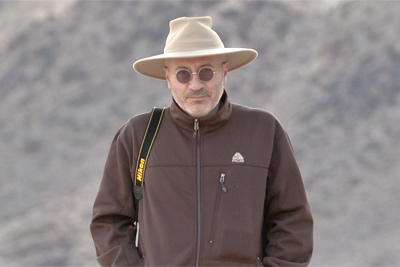A neuroscientific odyssey into how we 'remember the future'
By George Lowery

Shimon Edelman finds happiness when he hikes. He treks the canyons of the American southwest, the hills of the Negev Desert, the gorges of Ithaca. But soon after reaching a striking vista or lofty peak, Edelman gets the itch to move on. His sense of happiness as something to be pursued -- rather than captured -- inspired his new book.
In "The Happiness of Pursuit: What Neuroscience Can Teach Us About the Good Life" (Basic Books), Edelman, Cornell professor of psychology, acting as a Sherpa for the brain and mind, looks at the limitations and freedoms, evolutionary imperatives and neurological flares that drive human thought and behavior.
The book, Edelman's third, is free of academic jargon; he exiles scholarly references to chapter notes. He draws literary parallels, particularly from the "Odyssey" and "Romeo and Juliet," and indulges in occasional flashes of humor -- marmots, flying and otherwise propelled, figure in the narrative -- that he believes moved Amazon to categorize "The Happiness of Pursuit" under neuroscience and young adult. He hopes it is a "useful attempt at defining consciousness and what's happening in cognitive science."
Edelman predicates the book on a hypothesis that he believes is "absolutely the right way to think about human nature: We are literally computational devices." We make predictions, based on past performance, patterns and trends, that allow us to look into the future, and "All those are computational operations that can be spelled out," he notes.
Once attaining a peak, why do we grow restless? "The short of it is that evolution favors creatures that can see at least a bit into the future, for obvious reasons: to avoid nasty events [being eaten, for example] and succeed at your goals," Edelman says. "The more forethought or foresight we have, the more successful we are as a species. It's in our nature to look and think ahead. So that even when you are in a spot -- literally or metaphorically speaking -- that would seem to you to be well deserved, still there is something that arises within you after some time that pushes you forward."
Those calculations let us guesstimate which will be the shortest check-out line at the grocery, allow a baseball pitcher to calibrate his brain and body to burn a ball into the catcher's mitt, and let the average human make some sense of the daily onslaught of data. To survive, humans use their processing power to analyze and anticipate outcomes from incoming information and seek to be happy.
Author appearances
Shimon Edelman will appear at the Cornell Store Feb. 20 at 4 p.m. to read from his book and answer questions. He will also read from "The Happiness of Pursuit" March 8 at 6 p.m. at Buffalo Street Books.
What does happiness mean to Edelman? "The important thing is to distinguish between an immediate kick you get out of your senses -- something visceral, like your favorite food -- and a sense of well-being that is with you for some time," he says. "I'm not coming at this from the science of happiness in psychology. Your 'set level' of happiness is hard to change once you're an adult, but around that level, things can vary. We do have elbow room."
What can we do to rise above our genetically or evolutionarily preordained happiness level?
"Notice that the framers of the Constitution did not say we have a right to happiness; they say we have a right to the pursuit of happiness," Edelman says. "I like to think that the framers stressed the process of being after something, and of course happiness is worthy of pursuit. You get a kick out of pursuit if you are on your way up to that mountaintop; it's worth much more than having attained the summit."
Get Cornell news delivered right to your inbox.
Subscribe